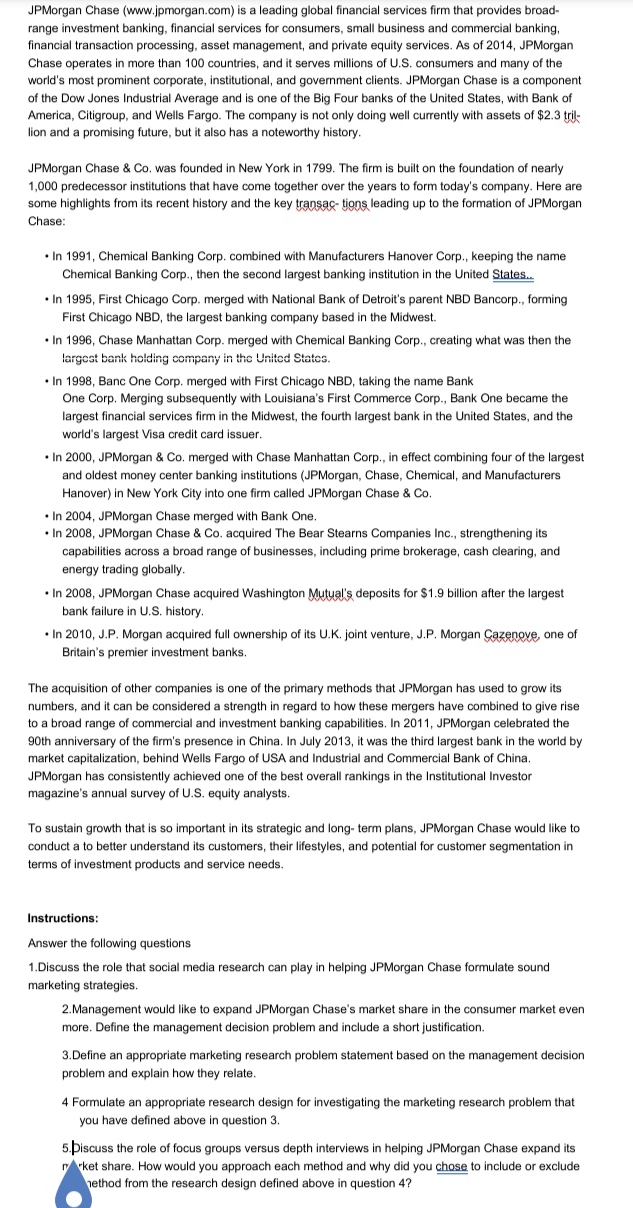please give the answer of following questions in Case study 1 - JP Morgan chase-
JPMorgan Chase (www.jpmorgan.com) is a leading global financial services firm that provides broad- range investment banking, financial services for consumers, small business and commercial banking, financial transaction processing, asset management, and private equity services. As of 2014, JPMorgan Chase operates in more than 100 countries, and it serves millions of U.S. consumers and many of the world's most prominent corporate, institutional, and government clients. JPMorgan Chase is a component of the Dow Jones Industrial Average and is one of the Big Four banks of the United States, with Bank of America, Citigroup, and Wells Fargo. The company is not only doing well currently with assets of $2.3 tril- lion and a promising future, but it also has a noteworthy history. JPMorgan Chase & Co. was founded in New York in 1799. The firm is built on the foundation of nearly 1,000 predecessor institutions that have come together over the years to form today's company. Here are some highlights from its recent history and the key transactions leading up to the formation of JPMorgan Chase: . In 1991, Chemical Banking Corp. combined with Manufacturers Hanover Corp., keeping the name Chemical Banking Corp., then the second largest banking institution in the United States. . In 1995, First Chicago Corp. merged with National Bank of Detroit's parent NBD Bancorp., forming First Chicago NBD, the largest banking company based in the Midwest. . In 1996, Chase Manhattan Corp. merged with Chemical Banking Corp., creating what was then the largest bank holding company in the United States . In 1998, Banc One Corp. merged with First Chicago NBD, taking the name Bank One Corp. Merging subsequently with Louisiana's First Commerce Corp., Bank One became the largest financial services firm in the Midwest, the fourth largest bank in the United States, and the world's largest Visa credit card issuer. In 2000, JPMorgan & Co. merged with Chase Manhattan Corp., in effect combining four of the largest and oldest money center banking institutions (JPMorgan, Chase, Chemical, and Manufacturers Hanover) in New York City into one firm called JPMorgan Chase & Co. . In 2004, JPMorgan Chase merged with Bank One. . In 2008, JPMorgan Chase & Co. acquired The Bear Stearns Companies Inc., strengthening its capabilities across a broad range of businesses, including prime brokerage, cash clearing, and energy trading globally. . In 2008, JPMorgan Chase acquired Washington Mutual's deposits for $1.9 billion after the largest bank failure in U.S. history. . In 2010, J.P. Morgan acquired full ownership of its U.K. joint venture, J.P. Morgan Cazenove, one of Britain's premier investment banks. The acquisition of other companies is one of the primary methods that JPMorgan has used to grow its numbers, and it can be considered a strength in regard to how these mergers have combined to give rise to a broad range of commercial and investment banking capabilities. In 2011, JPMorgan celebrated the 90th anniversary of the firm's presence in China. In July 2013, it was the third largest bank in the world by market capitalization, behind Wells Fargo of USA and Industrial and Commercial Bank of China. JPMorgan has consistently achieved one of the best overall rankings in the Institutional Investor magazine's annual survey of U.S. equity analysts. To sustain growth that is so important in its strategic and long-term plans, JPMorgan Chase would like to conduct a to better understand its customers, their lifestyles, and potential for customer segmentation in terms of investment products and service needs. Instructions: Answer the following questions 1.Discuss the role that social media research can play in helping JPMorgan Chase formulate sound marketing strategies. 2. Management would like to expand JPMorgan Chase's market share in the consumer market even more. Define the management decision problem and include a short justification. 3. Define an appropriate marketing research problem statement based on the management decision problem and explain how they relate. 4 Formulate an appropriate research design for investigating the marketing research problem that you have defined above in question 3. 5.Discuss the role of focus groups versus depth interviews in helping JPMorgan Chase expand its ket share. How would you approach each method and why did you chose to include or exclude method from the research design defined above in question 4







